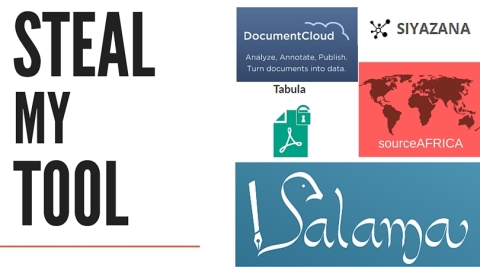
As part of the Knight International Media Innovators blog, the ICFJ Knight team will round up stories focused on how their fellows are making an impact in the field. Find out more about the fellows' projects by clicking here.
ICFJ Knight Fellows speak at IRE, Pakistani news station adopts Facebook Live and more from the Knight Fellows in this week’s roundup.
Free tools for investigative journalists presented at conference
Data and digital journalism tools developed through the work of ICFJ Knight Fellows were featured at a special event during this year’s Investigative Reporters & Editors Conference in New Orleans, June 16-20. David Lemayian, lead technologist of Code for Africa, and Amanda Strydom, managing editor of the African Network of Centers for Investigative Reporting (ANCIR), shared tips for working with African newsrooms and for networking with international journalists. ICFJ Knight Fellow Jorge Luis Sierra presented digital security tips for reporters. All three participated in ICFJ’s “Steal My Tool” event, which featured tools that investigative journalists can use for free. ANCIR was founded by ICFJ Knight Fellow Justin Arenstein.
.@ICFJKnight fellow, Jorge Luis showing Salama, a risk assessment tool for journos at #StealMyTool. #IRE16 pic.twitter.com/Lu32jcAg7b
— uɐıʎɐɯəl pıʌɐp (@DavidLemayian) June 17, 2016
Pakistani TV station goes "live" on Facebook
Geo TV is experimenting with using Facebook Live videos in new ways to drive engagement and expand the audience for its prime time news bulletins and its morning show. Working with ICFJ Knight Fellow Shaheryar Popalzai, Geo has become the first station in Pakistan to use Facebook Live to broadcast from inside its studios. “This has been important for Geo News because they are a broadcast channel and with the help of Facebook Live they will now be able to tap into a wider digital audience as well, focusing on original content for digital,” said Popalzai, who has provided technical and strategic guidance on the project.
Data journalism project focuses on disparities among South African commuters
Working in partnership with City Press newspaper, Code for South Africa’s Data Journalism Academy has shed light on racial disparities among South African commuters. Their data journalism project reveals how apartheid-era city planning continues to affect black residents in the country’s largest cities. Black South Africans often spend more time and money traveling to work than their white counterparts because they still live on the outskirts of cities. The Data Academy was launched with the help of recent ICFJ Fellow Ray Joseph.
.@City_Press on Sunday A data investigation by .@code4sa and .@City_Press The apartheid of space. Costs of commute. pic.twitter.com/YUc16EfsGe
— Ferial Haffajee (@ferialhaffajee) June 18, 2016
Creating “civic data” tools for citizens and journalists at Sierra Leone’s first data bootcamp
Code for Africa recently organized a four-day data bootcamp in Sierra Leone. “Digital innovation is really taking off in Sierra Leone, with lots of new initiatives. So, it was good to get everyone in a room to figure out how we can collaborate across organizations and industries,” said Morris Marah, founder of one of the local host organizations. Attendees participated in a hackathon and a series of data literacy training sessions. ICFJ Knight Fellow Temi Adeoye led sessions on finding data, how to clean up messy data and how to use advanced Google search features.
.@temideoye, @ICFJKnight Fellow pointing participants to #opendata portals w/ #SLE data #dBootcamp pic.twitter.com/P9MsBEQlKI
— Serah Njambi Rono (@CallMeAlien) June 15, 2016
This post was also published on IJNet, which is produced by ICFJ.
Main image screen shots courtsey of Tabula, Salama, sourceAFRICA, Document Cloud and Siyazana.